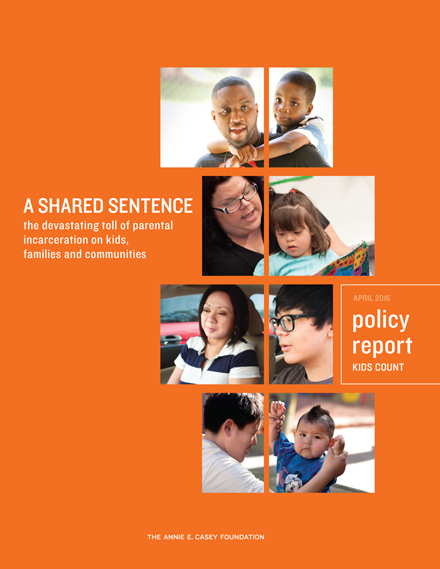
The Annie E. Casey Foundation today proposed recommendations state and local policymakers should adopt to help millions of children who struggle with emotional and financial instability as a result of having an incarcerated parent.
According to the new policy report, “A Shared Sentence: The Devastating Toll of Parental Incarceration on Kids, Families and Communities,” 88,000 children living in Wisconsin have experienced the separation of a parent who served time in jail or prison. Nationally, more than 5 million children have a parent that has been incarcerated. The effects of incarceration, the report says, can have as much impact on children’s well-being as abuse or domestic violence.
“Our nation’s over-reliance on incarceration has left millions of children poorer, less stable and emotionally cut off from the most important relationship of their young lives,” said Patrick McCarthy, president and CEO of the Casey Foundation. “We are calling on states and communities to act now, so that these kids — like all kids — have equal opportunity and a fair chance for the bright future they deserve.”
According to an analysis conducted by the Wisconsin Council on Children and Families (WCCF) last fall, Wisconsin taxpayers spend about $1.5 billion each year on corrections — significantly more than other states of similar size. Beyond the evident fiscal cost, the report found there are significant “opportunity costs” associated with the state’s out-sized reliance on incarceration, including how corrections costs reduce opportunities to invest in other important things like education, workforce development, and health care that can make Wisconsin healthier, more educated, and more equitable.

The WCCF report also found that Wisconsin state and local governments spend more on corrections than governments in the neighboring states of Michigan, Illinois, Minnesota, and Iowa. Wisconsin spends 3% (or $7) more per state resident on corrections than Michigan, the neighboring state with the highest corrections costs, and 70% (or $107) more on corrections per state resident than Iowa.
If Wisconsin spent the same amount as Iowa on corrections per state resident, our state and local governments would spend $613 million less on corrections each year.
The Annie E. Casey Foundation report also highlights other, sometimes “hidden” costs of our overreliance on incarceration, namely the economic and emotional impact on children who have parents that spend time in jails or prisons.
“It is all too easy to overlook the economic and psychological impact on a child when a parent is sent to jail or prison,” said Ken Taylor, executive director of WCCF, in a statement. “Although disparities occur in all states, Wisconsin faces a deeper challenge that we must address—we incarcerate a larger share of black males than any other state. This adds to a cycle of poverty and inequity for our children of color that places them at greater disadvantage.”
In order to minimize the impact of incarceration on the lives of children, the Casey Foundation report recommends that policymakers seek to reduce the number of individuals incarcerated, provide support for children when a parent is incarcerated, and ensure that a parent’s reentry to the home and community is successful to provide children with the stability and support they need to thrive.
Specific policy recommendations include:
1. Expanding strategies to reduce the flow of individuals into incarceration through strategies that focus on treatment, provide developmentally appropriate interventions and services (e.g. return 17 year olds to the juvenile system), and reduce the number of individuals returned to prison or jail for behaviors that are not new law violations;
2. Increasing the odds that individuals returning from jail or prison are able to find and maintain family-supporting employment; and
3. Focusing on strengthening communities or neighborhoods that are disproportionately affected by incarceration.
“The Wisconsin Council on Children and Families calls for policies and practices that put the needs of children of incarcerated parents first. We ask policy makers to address both the societal and fiscal implications mass incarceration has on our state, and to help ensure children who are suffering the consequences of their parents’ incarceration be provided with the stability and support they need to thrive,” said Taylor.



